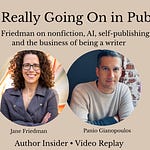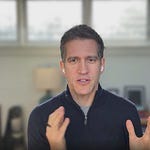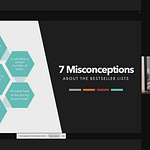Madeline McIntosh is the co-founder and CEO of Authors Equity, a new kind of publishing house built on a majority profit-share model that puts authors at the center of every decision. Before that, she spent decades within traditional publishing—including a run as CEO of Penguin Random House US—where she saw firsthand the frustrations and limitations of the industry’s standard playbook. Now she’s using that insider knowledge to rewrite the rules, from contract terms to cover design, and to create a model where publisher and author incentives actually align.
In our recent AMA, Madeline spoke with refreshing candor about what she’s trying to change in publishing, what authors often misunderstand about the business, and why the real work starts after your book hits the shelves. Here are nine of the smartest, most actionable takeaways from our conversation, each one worth bookmarking if you’re thinking about your next (or first) book deal.
(Editor’s note: some quotes have been lightly edited for clarity and concision.)
1. Advances aren’t always the win they seem
An advance feels like a victory: validation, security, and the freedom to focus on your book without financial panic. But the check isn’t free money; it comes with strings attached.
“If the publisher is writing you a check [for an advance]… there are a whole bunch of things that they get in exchange for that check. For one thing, in the United States, anyway, they usually get the exclusive right to your copyright forever, essentially for a lifetime. They also get to make all the decisions related to publication.”
This arrangement might be fine when everything goes smoothly, but when visions diverge—as they often do—the author has little leverage. Madeline’s point wasn’t “don’t take an advance,” but rather “understand what you’re trading for it, and decide if it’s worth the control you give up.”
2. The Authors Equity model keeps math—and incentives—simple
Madeline designed Authors Equity to avoid the endless wait for an advance to “earn out” and the opaque royalty statements that follow. Instead of locking authors into a system where the publisher is trying to recoup a big upfront payment, they split profits transparently after subtracting direct costs. The majority of those profits go to the author (distributed monthly).
“It should be math that, even as an art history major, I feel comfortable with, which is: every dollar that comes in, we divide it up the same way between us…. [As a result,] there isn’t the kind of finger-pointing that I saw happen all the time in my old job... we’re all in it together to try to get this book to sell.”
This incentive structure ensures that both parties are equally invested in the book’s success. And because there’s no complicated royalty math, conversations can focus on creative strategy rather than accounting battles.
3. Control can—and should—extend to design
In big publishing, “consultation” on a cover often means being shown three versions, all of which you dislike, and being told to pick one. Madeline flipped that approach, inviting authors and agents into live design sessions from day one. This way, everyone sees the comps at the same time and can make changes collaboratively, whether it’s a font tweak or a color shift.
The process removes the secrecy that fuels tension between marketing, editorial, and the author. For nonfiction writers, especially those in business, self-help, or idea-driven markets, where a cover can make or break sales, having a say can be critical.











